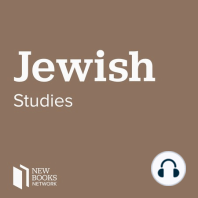81 min listen

Federica Francesconi, "Invisible Enlighteners: The Jewish Merchants of Modena, from the Renaissance to the Emancipation" (U Pennsylvania Press, 2021)
Federica Francesconi, "Invisible Enlighteners: The Jewish Merchants of Modena, from the Renaissance to the Emancipation" (U Pennsylvania Press, 2021)
ratings:
Length:
52 minutes
Released:
Feb 14, 2022
Format:
Podcast episode
Description
In her recent book on the Jewish community of Modena in Italy, Federica Francesconi tells a tale of contradictions. Segregated to the city’s ghetto in the 17th century, the Jewish merchants of the city nonetheless possessed an enormous presence in its economic, governmental and cultural milieu. By the start of the 19th century, these merchants even took center stage in Modena’s political scene following Napoleon’s conquest of Italy and the subsequent abolition of the ghettos themselves. How did this transformation occur? In what ways had life in the Modena – and in the Modenese ghetto – prepared these Jewish merchants to perform such leadership roles and to advocate fluently for the values of the French Enlightenment? To answer these questions, Francesconi tracks the development of the Modenese Jewish community since the arrival of her protagonists in the city in the middle of the 16th century, describing the techniques that merchant family members employed to stay abreast of – and innovate on – Modenese, Italian and European intellectual trends. The reader is not only privy to the economic activities of these figures, but also sees how they acted – for centuries – as cultural intermediaries for the rulers of the Este Duchy, who sought their advice on purchases of art, books and pieces of material culture. The book thus features Jews that do not fit neatly on the dichotomy between assimilation/conversion and communal isolation, but instead embodied aspects of both the ghetto society they dominated and the broader city setting with which they continually engaged.
As the narrative progresses, the archival material that Francesconi has uncovered also gives readers glimpses into the rich social life of an Early Modern Jewish community in the midst of gradual change. The merchants’ personal worship sites became synagogues for the whole ghetto. Their personal libraries – stocked with Kabbalistic masterpieces – were the sites of communal activity. Excluded from official leadership, Modenese Jewish women nonetheless found avenues to participate in shaping their own religious practices and the moral priorities of the community at large. Itself a series of cordoned off houses and living spaces, the ghetto was both “domestic” and a venue that fostered a nascent “civil society”; a “laboratory” that gave the Jewish merchants of Modena their first experiences with governmental practices.
At once an intellectual, socio-economic, religious and cultural history, Invisible Enlighteners: The Jewish Merchants of Modena, from the Renaissance to the Emancipation (U Pennsylvania Press, 2021) is not only a microhistory of Jewish life over the course of three centuries. It is, moreover, a model for understanding how Jews navigated, interpreted and even co-opted the policies of state institutions that emerged for the first time in the Early Modern period.
James Benjamin Nadel is a Ph.D. student in the Department of History at Columbia University.
Learn more about your ad choices. Visit megaphone.fm/adchoices
Support our show by becoming a premium member! https://newbooksnetwork.supportingcast.fm/jewish-studies
As the narrative progresses, the archival material that Francesconi has uncovered also gives readers glimpses into the rich social life of an Early Modern Jewish community in the midst of gradual change. The merchants’ personal worship sites became synagogues for the whole ghetto. Their personal libraries – stocked with Kabbalistic masterpieces – were the sites of communal activity. Excluded from official leadership, Modenese Jewish women nonetheless found avenues to participate in shaping their own religious practices and the moral priorities of the community at large. Itself a series of cordoned off houses and living spaces, the ghetto was both “domestic” and a venue that fostered a nascent “civil society”; a “laboratory” that gave the Jewish merchants of Modena their first experiences with governmental practices.
At once an intellectual, socio-economic, religious and cultural history, Invisible Enlighteners: The Jewish Merchants of Modena, from the Renaissance to the Emancipation (U Pennsylvania Press, 2021) is not only a microhistory of Jewish life over the course of three centuries. It is, moreover, a model for understanding how Jews navigated, interpreted and even co-opted the policies of state institutions that emerged for the first time in the Early Modern period.
James Benjamin Nadel is a Ph.D. student in the Department of History at Columbia University.
Learn more about your ad choices. Visit megaphone.fm/adchoices
Support our show by becoming a premium member! https://newbooksnetwork.supportingcast.fm/jewish-studies
Released:
Feb 14, 2022
Format:
Podcast episode
Titles in the series (100)
Richard Rashke, “Useful Enemies: John Demjanjuk and America’s Open-Door Policy for Nazi War Criminals” (Delphinium, 2013): You may have heard of a fellow named Ivan or John Demjanuik. He made the news–repeatedly over a 30 year period– because he was, as many people probably remember, a Nazi war criminal nick-named “Ivan the Terrible” for his brutal treatment of Jews (and o... by New Books in Jewish Studies